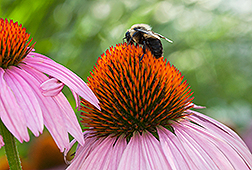Gardening Tips
with the U.S. National Arboretum
June 7, 2023
1:00 p.m. (EST)
ARS horticulturalists Christine Moore and Bradley Evans with the U.S. National Arboretum in Washington, DC, provide tips on how to have a successful garden at home. The experts share best practices for growing and maintaining plants, including orchids and succulents, and answer questions.
Q. Is it best to use Miracle grow potting soil, or bags of garden soil?
A. You could use garden soil, yes, but sometimes the soil is heavy clay or maybe sandy. So, it's easier to start out with a mix that is predictable, and you know exactly what's in it that doesn't really need to be amended. Start fresh, if you can, but garden soil can work as well, if need be. Garden soil doesn't have any added fertilizer, though, so you'll need to add your own to the garden soil.
Q. Can I fill the bottom of my container with compost or leaves to fill up the space for vegetables?
A. We wouldn't recommend that. Goes along with the idea of rocks. You're adding a different substrate. We recommend sizing the pot to the plant rather than trying to retrofit the pot. If you want to use that pot. then maybe use it as a "liner" and put the veggie in an appropriately sized pot and then place that pot into the "decorative" pot.

Q. What about planting native plants? What should people know about that? What are good places to find native plants?
A. Most of the principles still apply to natives, but many natives are ecosystem-specific, so the grower would need to research the requirements of those plants (e.g., water needs, light, etc.) and group plants accordingly (water, light, etc.). We will include sources for native plants on our website.
Q. Are there kinds of plants people should plant to support pollinators, or some to avoid because they're useless (or harmful) to pollinators?
A. There are many plants that support pollinators whether native or not. Butterflies love Mexican sunflower, for example, but it's not "native." It depends on whether you want to specifically grow natives as your objective. But there are non-natives that are also enjoyed/appreciated by pollinators. There are some plants that are not good for pollinators, so yes, you should research those plants beforehand, so you are aware of what those are.
Q. Is there a watering difference between ceramic, plastic, and clay pots?
A. Yes. Clay dries out the fastest; ceramic a bit more slowly, and the plastic needs the least amount of water. But that also depends on how many plants you have in the pot and whether they are really thirsty types! Then, the plastic still might need a decent amount of water.
Additional Resources:
- The Herb Society of America
- For information on orchids, Orchid Society of America and National Capital Orchid Society
- Directory of extension agencies for the respective states/regions
- U.S. National Arboretum
- U.S. National Arboretum's free mobile App - download from: Google Play (Android devices) | App Store (Apple devices)
